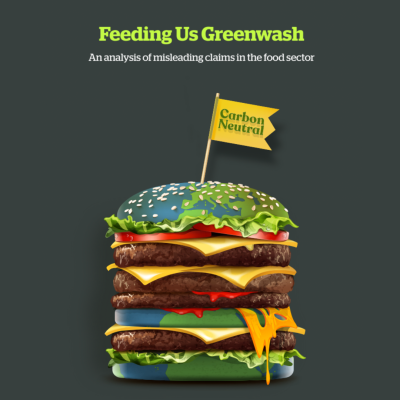In recent years there’s been a surge of climate labels like ‘carbon neutral’ or ‘climate positive’ on food products, even on high emissions foods like meat and dairy. Not to mention that if you looked at the packaging and advertising of dairy products, you’d assume they all come from a few happy cows in a green field and so are totally sustainable. Together these labels and the marketing of meat and dairy create the impression that the aim of ‘less and better’ is almost achieved.
Along with partner organisations across Europe, we exposed 54 examples of greenwashing from major food companies around the world and added them to the site www.greenwash.com.
80% of all the claims found were related to climate, with more than half of those explicitly relying on offsetting (with labels like ‘carbon neutral’ or even ‘carbon negative’). In addition to climate claims, we discovered more subtle types of greenwashing, such as depictions of meat and dairy as connected to nature and an unrealistic projection of sustainable farming.
To understand how consumers respond to these claims we commissioned polling in the UK and Germany revealing:
- Almost half (49%) of adults regularly buy products with sustainability labels or certification
- 40% are more likely to buy a meat or dairy product with a “carbon neutral” or “climate positive” label, than the same without such labels
- Almost a third (29%) are willing to pay more for products labelled carbon neutral, climate positive or low methane
Whilst on the surface climate labels as well as adverts and branding highlighting sustainable or ‘regenerative’ farming, may look like genuine attempts by companies to make a difference, we found this is often far from reality with claims lacking substantiation, being exaggerated or straight up misleading. When consumers are choosing these products, they are under the illusion that they are part of the positive change for the environment, when in fact they are being sold empty promises.
The case for less and better meat for instance is weakened if companies have consumers believe that all their cows are roaming expansive fields. The case for government targets and policies to cut methane from meat and dairy in line with climate science becomes a lot harder to make if shelves are filled with so-called ‘low-carbon’ beef products and ‘CO2 neutral’ milk.
That’s why we’re calling for a clamp down on greenwashing, recommending that instead governments must ensure meat and dairy companies reduce their climate footprint by setting binding climate targets and reporting - including on very potent methane emissions.
On the day of the launch of our new report (21st March 2023), we submitted all 17 UK examples to the Competition and Markets Authority as part of their Green Claims Code enforcement and will be calling on them to take action, including banning these misleading climate claims.
In addition to this, a new Bill on Digital Markets, Competition and Consumer Bill, to be introduced in Spring 2023, will give the CMA powers to impose penalties on companies for misleading green claims. These penalties should be strong enough to serve as a deterrent to companies looking to use unsubstantiated or misleading claims to make them or their products and services seem sustainable.
Our food systems are responsible for a third of human-caused emissions and stopping food companies from greenwashing their image will be key in this critical decade for climate action. But just tackling greenwashing will not be enough – we need public policies that ensure that consumption of animal products is reduced in line with dietary health guidance, while food production is reformed towards more sustainable and regenerative methods.
Follow @Greenwashdotcom on Twitter and Instagram for all the latest, delve into the dystopian laundrette at www.greenwash.com and read the full report here.
